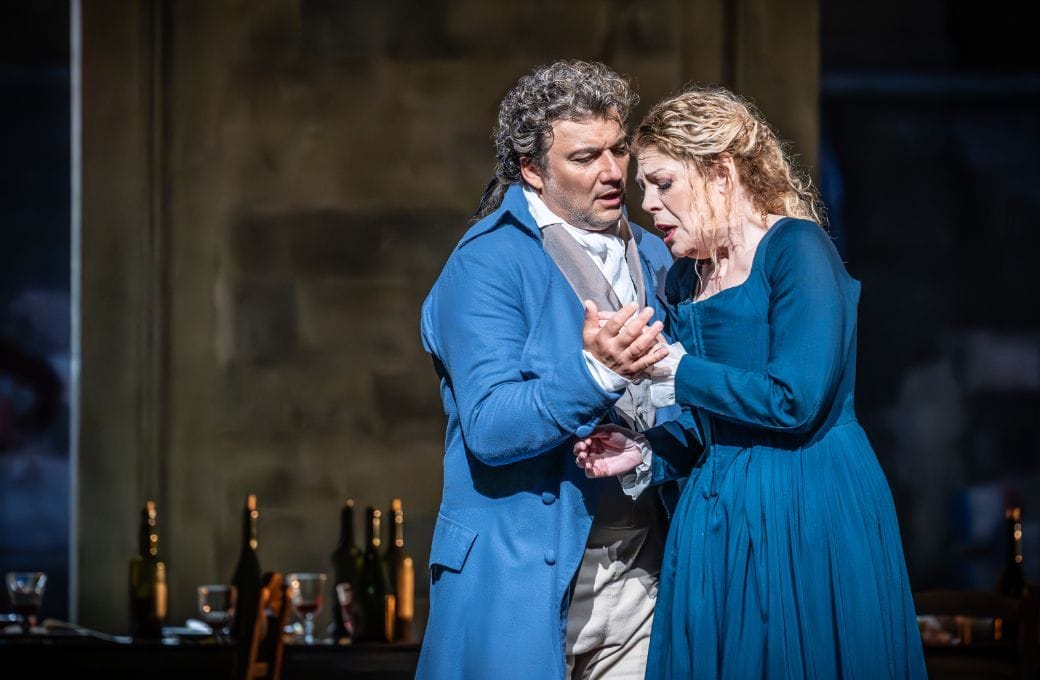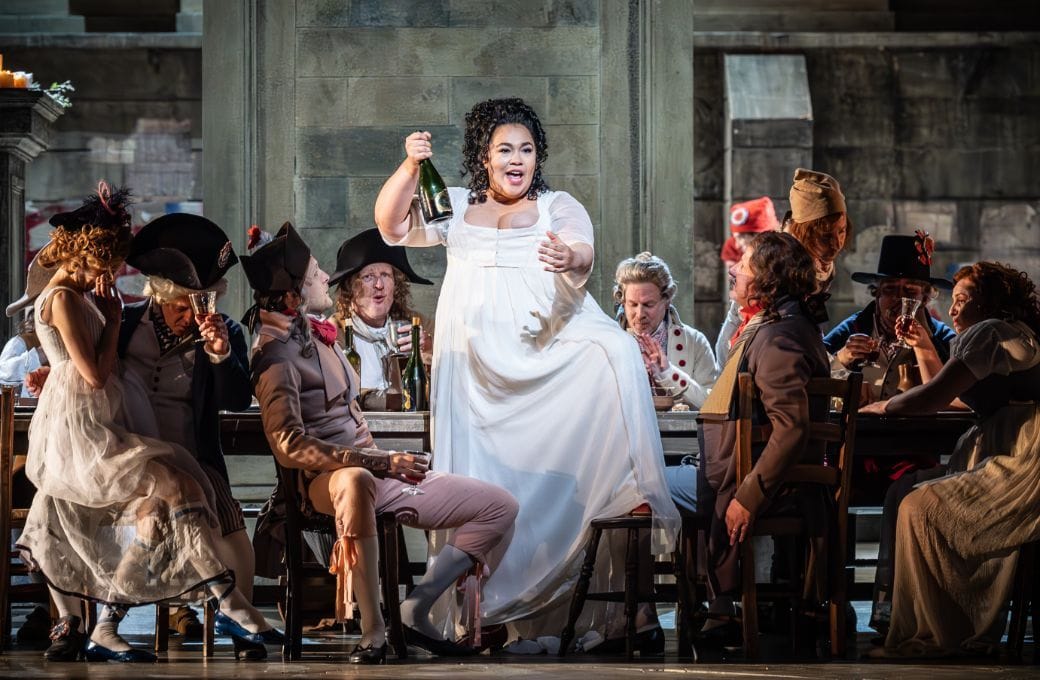
Giordano Andrea Chénier Cast; Chorus and Orchestra of the Royal Opera House, Covent Garden / Sir Antonio Pappano. 30.05.2024
Production:
Director – David McVicar
Revival director – Thomas Guthrie
Set designer – Robert Jones
Costume designer – Jenny Turamani
Lighting designer – Adam Silverman
Choreography,, movement – Andrew George
Revival Choreohraphy (act 1) – Agurtzane Arrien
Cast:
Andrea Chénier – Jonas Kaufmann
Maddalena de Coigny – Sondra Radvanovsky
Carlo Gérard – Amartuvshin Enkhbat
Roucher – Ashley Riches
Contessa di Coigny – Rosalind Plowright
Bersi – Katia Ledoux
Pietro Fléville – William Dazeley
Madelon – Elena Zilio
Mathieu – James Cleverton
Major-Domo – Simon Thorpe
An Old Gardener (Gérard’s father) / Gravier de Vergennes – Richard Holliday
Filandro Fiorinelli – Rich Gittins
The Abbé – Aled Hall
Orazio Coclite – Michael Kenneth Stewart
Maximilien Robespierre – Andrew Hobday
Madelon’s Grandson – Harry Sandringham
Dumas – Jamie Woollard
Laval Montmorency – Irene Hardy
Idea Legray – Judith Georgi
Schmidt – Jeremy White
Sir Antonio Pappano bids farewell to Covent Garden with his terrific performance Umberto Giordano’s verismo classic Andrea Chénier. The orchestra, already a world-class ensemble, truly outdid themselves on this particular evening. Detail was magnificent (which itself counterbalances any tendency towards indulgence). Brass were imposing; woodwind sprightly; string silken, even in the violins’ upper registers.
This is an opera that deserves more outings than it actually gets. A concert performance by Chelsea Opera Group in May 2022 was my last experience of Giordano’s magnificent score (review). It benefits from a traditional staging, such as this one from David McVicar (Mario Martone’s Scala production, captured on DVD/Bluray from La Scala, satisfies for the same reason). McVicar’s production of Giordano’s ‘dramma istorico’ – sometimes rendered as ‘Dramma di ambiente storico’ – was first tseen (and premiered in London) in 2015, again with Jonas Kaufmann in the title role. The production’s attention to detail (superb costumes from Jenny Tiramani) and its perfectly-placed set (Robert Jones), seen across the acts, conspire to provide the perfect setting.
Giordano’s opera is set in the French Revolution where the terrors under Maximilian Robespierre sent shockwaves across Europe. Andrea Chénier is loosely based on fact. It does share tropes with Puccini’s Tosca (imprisonment, a bullying Scarpia-like Carlo Gérard and his confrontation with the leading lady, here Maddelena de di Coigny. Girodano’s score evokes both worlds of the Ancien régime and the Revolution with incredible skill, something emphasised by Pappano’s handling of the orchestra.
This might be verismo, but Giordano is capable of subtlety and tenderness (arguably, more so than Puccini). It was the variegated nature of the score, from huge choral scenes (the Covent Garden Chorus as so often in perfect, lusty form) to soul-breaking tenderness and, indeed, heartbreak that was the impression left at the end.
Placing the opera so squarely in its time enabled complete immersion in Giordano and Luigi Illica’s drama. Spectacle is an important part here, and it needs vocies to mach. The clear star of the evening (in a cast of stars) was Amartuvshin Enkhbat’s Carlo Gérard, who actually is the first voice we hear. His voice is a kind of golden velvet, commanding but never strained, and he has the stage presence to match. He replaces the originally intended Carlo of Carlos Álvarez, but it is impossible to imagine a finer assumption. The third act ‘Nemico della patria’ was greeted with an enormous and prolonged ovation, richly deserved), a powerhouse of emotion completely supported by Pappano and his players. Another stand-out was the Bersi of Katia Ledoux, all revolutionary fervour. Ledoux previously impressed as Paola in Offebach’s La princesse de Trébizonde in a concert performance at the Queen Elizabeth Hall (review); this was her Royal Opera debut and I very much hope to see and hear her again, although between Offenbach and Giordano, she has spent her time between Zürich, Stuttgart and Vienna (the Volksoper).

But what of the two leads? Jonas Kaufmann was Chénier, not completely in full voice in the first act, perhaps saving himself for the vocal glories he delivered later in the opera. In the second act there was almost a juxtaposition of Kaufmann in full voice against a repeated ascent that each time felt weak. He does inhabit the role dramatically, though, and for all of Chénier’s interactions with his Maddalena, it was his scenes with the character Roucher that stood out. That role was taken by Ashley Riches, not a singer I associate with verismo but how powerful this was. The times Riches has proved himself previously are too numerous to mention, but this seemed to add another dimension to his activities. Both Riches and Kaufmann were completely absorbed in the dialogues.
And the Maddalena, Sondra Radvanovsky? This was, I believe, the finest I have heard her. Her third act ‘La mamma morta’ (supported by some superb string playing from the pit) was intensely memorable, shot through with believable emotion; the resulting ovation was, again, just. Radvanovsky and Kaufmann made for a powerful couple in the final act, rapturously preparing to be together in death (‘Vicino a te s’acqueta’); worth noting, perhaps, the orchestra was absolutely aglow at this point
In 1984, Rosalind Plowright sang Maddalena at Covent Garden. In 2019, as here, she sang the Countess de Coigny. She owned the stage, a full confidence assumption, treasurable and impressive. Of the remaining smaller roles, one has to mention Aled Hall’s immensely characterful Abbé and Alexander Karavets’ strong Incroyable. William Dazeley impressed as Pietro Fléville, and who could ever forget veteran Elena Zilio’s phenomenally gripping old lady Madelon? – a whole world of experience compacted into a short, but golden, transfixing nugget of time.
Even the programme booklet even gets a thumbs up: a superb elucidation of the action, historical notes explaining the various terms (‘sans-coulottes,’ ‘incroyables,’ ‘merveilleuses,’ and so on) and, among other articles, a riveting overview of The French Revolution by William Doyle.
As an exit strategy after 22 years at the helm at Covent Garden, Pappano’s choice of opera cannot be faulted. This was at once the orchestra and chorus paying tribute by giving their all, and Pappano’s own tribute to a great score. Unforgettable.
And recordings? The Mario Martone production captured on Blu-ray/DVD at La Scala with Yusif Eyvasov and Anna Netrebko in the principal roles, conducted by Riccardo Chailly, also has a detailed, traditional staging coupled with a performance that is just on fire. The Carlo is Luca Salsi. The Blu-ray on Amazon is here; the DVD here (there’s only about a pound between them and, unusually, the Blu-ray is the cheaper of the two).Pappano himself has recorded the piece, with Kaufmann (and Eva-Maria Westbrock as Maddalena). Riccardo Chailly’s audio recording is more famous, featuring as it does one Luciano Pavarotti in the title role; the cast also includes stars Montserrat Caballé and Leo Nucci, and is available on Amazon here.











